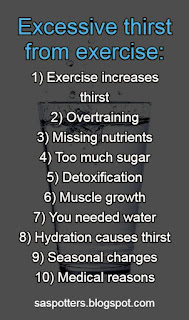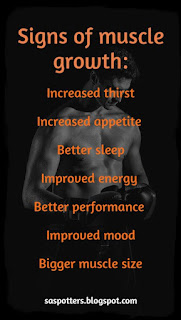 |
Thirst is an indication that you could be doing more for your health. |
Why you are so thirsty from exercise
- Exercise increases the body's need for water in general
- You're over trained
- Missing nutrients
- Too much sugar
- Detoxification
- Extreme muscle growth
- Your body was desperate for water all along
- Hydration leads to greater thirst
- Seasonal changes
- Medical reasons
 |
| Share this image on social media. |
It is normal to be extra thirsty from exercise?
Exercise increases thirst. When muscles are used, they expand and take blood out of the circulatory system so that they have the nutrients that they need to perform. This happens in both cardiovascular forms of exercise and anaerobic exercises. Other reasons for exercise-induced thirst need to be addressed immediately.
Muscles increase in volume more during anaerobic forms of exercise like weight lifting, compared to aerobic exercises like running. This is because the individual muscle fibers are used to a greater extent. When muscles temporarily increase in size as a response to exercise, it is known as a muscle pump. The water volume of muscles is greatly increased during when they experience a muscle pump.
1) The general thirst-inducing effects of exercise
Muscles increase in volume more during anaerobic forms of exercise like weight lifting, compared to aerobic exercises like running. This is because the individual muscle fibers are used to a greater extent. When muscles temporarily increase in size as a response to exercise, it is known as a muscle pump. The water volume of muscles is greatly increased during when they experience a muscle pump.
Since blood flow (which is mostly made up of water) is redirected into the muscle, your body will thirst for water so that there is still enough blood to circulate throughout the body.
Shortly after exercise, muscles decrease in volume back to normal size and blood is released back into circulation. This can decrease thirst for water and increase urination as less blood volume is needed.
Thirst may still be elevated after exercise because your body wants to flush out the by-products of exercise (like lactic acid and other toxins released during exercise) through urination. Sweat increases your nutrient and water requirement as well, even though sweating is actually very healthy.
Increased body temperature and body heat also increase your body's need for water. Body heat dilates blood vessels and expands the amount of water that your body holds onto.
Thirst may still be elevated after exercise because your body wants to flush out the by-products of exercise (like lactic acid and other toxins released during exercise) through urination. Sweat increases your nutrient and water requirement as well, even though sweating is actually very healthy.
Increased body temperature and body heat also increase your body's need for water. Body heat dilates blood vessels and expands the amount of water that your body holds onto.
While it is perfectly natural for your body to need to more water than usual during exercise, you might be a lot thirstier than you should be. This could be due to a variety of reasons.
Today we are going to look at the most common reasons why you feel extra thirsty throughout the day because of exercise - and what you should do about it.
Today we are going to look at the most common reasons why you feel extra thirsty throughout the day because of exercise - and what you should do about it.
Reasons why exercise is making you more thirst than you should be
Thirst is a big indication of what is going on in your body. If you are following a good muscle building program and you experience more thirst than usual, here are the most probable causes. One of them might be insane muscle growth!2) Over training
The most common reason why people who train regularly feel overly thirsty is because of over training. An unquenchable thirst is one of the most common symptoms of over training.
If you experience any of the other symptoms of over training, give yourself a break to let your body recover fully. You will start seeing positive results again soon afterwards.
If you experience any of the other symptoms of over training, give yourself a break to let your body recover fully. You will start seeing positive results again soon afterwards.
Other symptoms of over training
- Depression
- Change in sleeping patterns (sleeping more usual or not being able to sleep)
- Lack of motivation (During exercise and everywhere else)
- Feelings of guilt and failure when it comes to exercise
- Stagnated progress (in both body composition and performance)
- Low libido (due to plummeting hormone levels)
- Abrupt changes in appetite (more or less than usual)
If you feel like you might be over trained, take a rest week. Focus on optimal recovery during your rest week (see how in the link). If physical performance improves and you start seeing positive results in your body, your central nervous system simply needed a break.
Take a rest week every 8 week cycle to prevent over training in the future. Keep a look out for the above over training symptoms so that you don't push past what should be for optimal growth. Too much training can lead to catabolism (muscle breakdown).
Take a rest week every 8 week cycle to prevent over training in the future. Keep a look out for the above over training symptoms so that you don't push past what should be for optimal growth. Too much training can lead to catabolism (muscle breakdown).
 |
| Make sure that you aren't pushing your body too hard. Share this. |
3) Lack of nutrients
The second most popular reason why you could be thirsty all of the time is a lack of the nutrients that your body needs.
Electrolytes and minerals are the first nutrients that you lose during exercise (before sugar, protein and fat). Your body uses electrolytes to hold onto water.
You lose electrolytes every time that you sweat, cry, poop, urinate or exercise. Muscles need electrolytes to exchange signals with the central nervous system. They also need electrolytes to contract or expand.
You lose electrolytes every time that you sweat, cry, poop, urinate or exercise. Muscles need electrolytes to exchange signals with the central nervous system. They also need electrolytes to contract or expand.
If you don't replace lost electrolytes, your body can't hold onto water and it runs right through you -instead of going to the places that need it the most. This can lead to a thirst for water no matter how much you drink because water is eliminated before it can hydrate the body.
You lose electrolytes every time that you urinate. The problem gets worse and worse. You won't be able to quench your body's thirst for hydration - no matter how much water you drink.
You lose electrolytes every time that you urinate. The problem gets worse and worse. You won't be able to quench your body's thirst for hydration - no matter how much water you drink.
Is a lack of electrolytes causing my thirst?
How do you know whether your body has enough electrolytes? The most accurate way is to get your electrolyte levels checked out by a doctor. The second best way is to monitor how often you urinate in comparison to how often you drink water.If I pee way too quickly after drinking water, and if I release more than what I've put in, I know that I need to up my electrolyte intake.
The third best way is to check your blood pressure. Blood pressure directly relates to blood volume. Blood volume increases and decreases with the amount of water that your body is holding. If you lose too many electrolytes and your body releases water as a response, your blood pressure will drop.
Inversely, you need more plain water to flush out the excess electrolytes if your blood pressure is too high.
Check out these signs of low blood pressure if you think that you might not be replacing your electrolytes well enough.
4) High blood sugar
Excess thirst is a good indication that your workout nutrition is too high in sugar.
When your blood sugar levels are too high, you can experience extreme thirst. Sugar is gyroscopic. That means that it absorbs water. If there is too much sugar in your blood, it will pull water out of the cells that need it and those cells will start to die off.
When your blood sugar levels are too high, you can experience extreme thirst. Sugar is gyroscopic. That means that it absorbs water. If there is too much sugar in your blood, it will pull water out of the cells that need it and those cells will start to die off.
One of the ways that the body tries to prevent this from happening is to crave more water so that the sugar can be diluted. If you aren't sensitive enough to insulin, sugar can't be shuttled out of the blood and your body will create extreme thirst because cells are drying out from the sugar.
This is possible if you consume foods or beverages that are too high in sugar when you exercise. Many sports drinks and protein supplements are extremely high in sugar.
5) Detoxification
A lot of rehabilitation centers use exercise to get chemicals out of the body as soon as possible. One of the fastest ways to get rid of nicotine from smoking, for example, is exercise.
The prolonged symptoms of many withdrawal processes include thirst and thirst-induced symptoms (headache, nausea and diarrhea) because the body tries to eliminate these toxins and return to normal. Urination is one of the most effective methods of toxin elimination.
Exercise causes the release of toxins that are buried deep within tissues. When exercise starts to burn fat, fat-soluble toxins are also released. These toxins no longer lay dormant deep within the body but end floating around in the blood stream, ready to be eliminated.
Your body needs water to eliminate these toxins. Your thirst could be an indication that your body has uprooted, unwanted chemicals that need to be disposed of via urination.
The detoxing effects of exercise explain why urine may take on a darker color than usual after an intense exercise session.
I use the color of my urine to determine whether my body is busy eliminating more toxins than usual.
If the detoxifying effects of exercise are dramatically increasing your thirst, you should start by looking at whether you are currently adding more toxins to your body.
Things that place a greater toxic burden on your body:
- Foods (Processed food, artificial colorants and flavors)
- Non-water beverages
- Supplements (Should be an addition to a healthy diet, NOT your main source of nutrition)
- Medications
- Alcohol
- Addictive substances
- Stress
- Polluted air and air conditioning
 |
| These things increase your body's need for toxic elimination. |
The first step would be to eliminate as much of these toxins as possible. In the case of medication, speak to your doctor about your concerns before making any changes. Lemon juice, green tea, and fibrous foods like spinach are other great ways to help your body get rid of these toxins.
6) Extreme Muscle Growth
One of my favorite reasons why exercise increases thirst is because of muscle growth. I have experienced this a few times. I start a new workout program and I experience extreme thirst for a week or two. Shortly afterwards, my muscles grow like crazy.Muscle takes a lot of water to grow. Firstly, muscles are 80% water (79% to be exact).
This is not the primary reason why a growing muscle becomes a thirsty muscle. The biggest thirst-inducing effects of muscle growth lie in the fact that nutrients need to be synthesized, transported, exchanged and transformed into muscle fiber.
All of the by-products of these processes require water. A lot of this water is eliminated shortly afterwards (to get rid of the by-products of these processes) and your body will require fresh water to resume the muscle building process.
Why can't your body use the same water for this process without the need for extra water, if most of it is going to be urinated out anyway?
Protein from food is turned into amino acids. Amino acids are transported to the muscle. They turn into new muscle fibers. Muscle fibers are filled with nutrients (like glucose, minerals and water). Every step of this process requires water. Each step also creates by-products that need to be eliminated.
If you'd like to know whether muscle growth is the reason for your excessive thirst, here are a few other signs that should tell you that your body is growing muscle.
Other signs of muscle growth:
- Increased appetite (may also indicate that your metabolism is improving)
- Greater sleep need (and improved sleep quality)
- Greater vein visibility (vasodilation)
- Improved energy levels
- Better performance at the gym (you keep beating your personal best records)
- Improved mood
- Bigger muscle size
 |
| Are you actually growing muscle? |
Non-exercise related causes of extreme thirst
Your extreme thirst might not have anything to do with exercise at all. Here are some other reasons why you might be more thirsty than usual.
7) You could have been thirsty all along
So many people don't realize how thirsty they have been until they start drinking more water.
Many people are fatigued and struggle with concentration because of dehydration. Dehydration leads to cravings for sugar, sodas (which dehydrate your body even more), caffeine, alcohol or nicotine. All of these substances could make you feel better for a while, but leave you even more dehydrated than when you started. As you continue this cycle, your body gets more and more dehydrated.
Caffeine and thirst
Many health practitioners now say that caffeine-laden drinks like coffee and tea don't dehydrate you. They say that the water in coffee or tea compensates for the diuretic effects of the caffeine. It is now commonly accepted that drinking coffee or tea is better for hydration than drinking nothing at all.
I don't want to argue about whether coffee/tea increases or decreases your hydration levels. What we do know for sure is that sugar has a devastatingly dehydrating effect on your body.
The point is that dehydration (a need for water and electrolytes) decreases energy levels, performance and concentration. Energy-boosting substances treat the symptom without addressing the cause. We mask our body's need for plain water and this leads to further dehydration.
 |
| Do not hide from the problem. Solve the problem. |
Hydration is better at boosting energy and mood than other substances
When I was still a smoker, I once told myself that whenever I craved a cigarette, I had to drink a glass of water first. If I still craved a cigarette after the water, I could have one. Surprisingly, more than half my nicotine cravings where caused by dehydration.
As you drink less and less water every day (because you are turning to other substances instead), your body learns to cope with its dehydrated state in order to survive. It becomes easier to live in a state of dehydration without ever knowing how much water you actually need.
The other day, for example, I was extremely tired. I drank a ton of water in case it might be dehydration - which it was. My energy levels increased within a few minutes and I was back to normal.
It is important to note that the wrong balance between water and electrolytes can also increase thirst. See point 3 to determine whether you need more or less electrolytes as part of your hydration strategy.
Conversely, water is also needed during summer as blood vessels expand in the heat to hold more blood. Water needs increase as you sweat more.
8) Thirst leads to thirst
This is more of an extension on my previous point. Many of my clients report that they feel more thirsty than usual when they start hydrating themselves properly.Why do you get thirstier when you start hydrating yourself properly?
You are basically telling your body that water is available whenever it needs it. Whenever you hydrate yourself properly, you satisfy a need that you didn't know you had. Your brain learns to make the connection between thirst-induced symptoms and hydration.It is important to note that the wrong balance between water and electrolytes can also increase thirst. See point 3 to determine whether you need more or less electrolytes as part of your hydration strategy.
9) Seasonal changes
You should notice an increase in your thirst levels whenever the seasons change. It takes energy for your body to adapt to new temperatures.
Water is required as the metabolism speeds up to compensate for colder climates. Water is also needed to store nutrients during the winter months.
Conversely, water is also needed during summer as blood vessels expand in the heat to hold more blood. Water needs increase as you sweat more.
10) Medical reasons
There are many medical reasons why you could be experiencing excessive thirst. One of the primary symptoms of diabetes, for example, is excessive thirst. Changes in blood pressure or hormone levels can also induce greater thirst.Too much or too little of certain nutrients can also trigger thirst (The keto diet is a good example of this). Certain medications (like antibiotics) will also dramatically increase your thirst. To check whether your thirst is medically related, discuss your concerns with your medical practitioner.
Have you figured out the cause of your exercise-induced thirst? Have you learnt anything new from this article? I'd love to hear from you in the comments below. Stay Strong!
 |
| Support our website and buy this awesome Tee Shirt. |


No comments:
Post a Comment